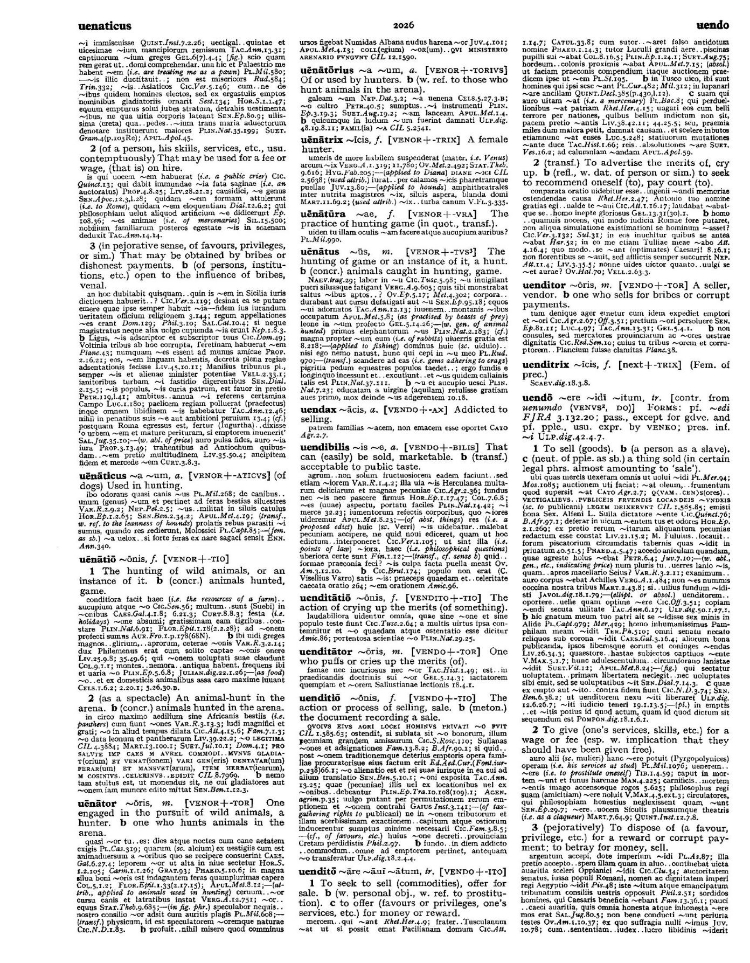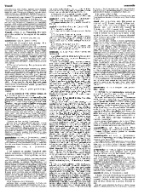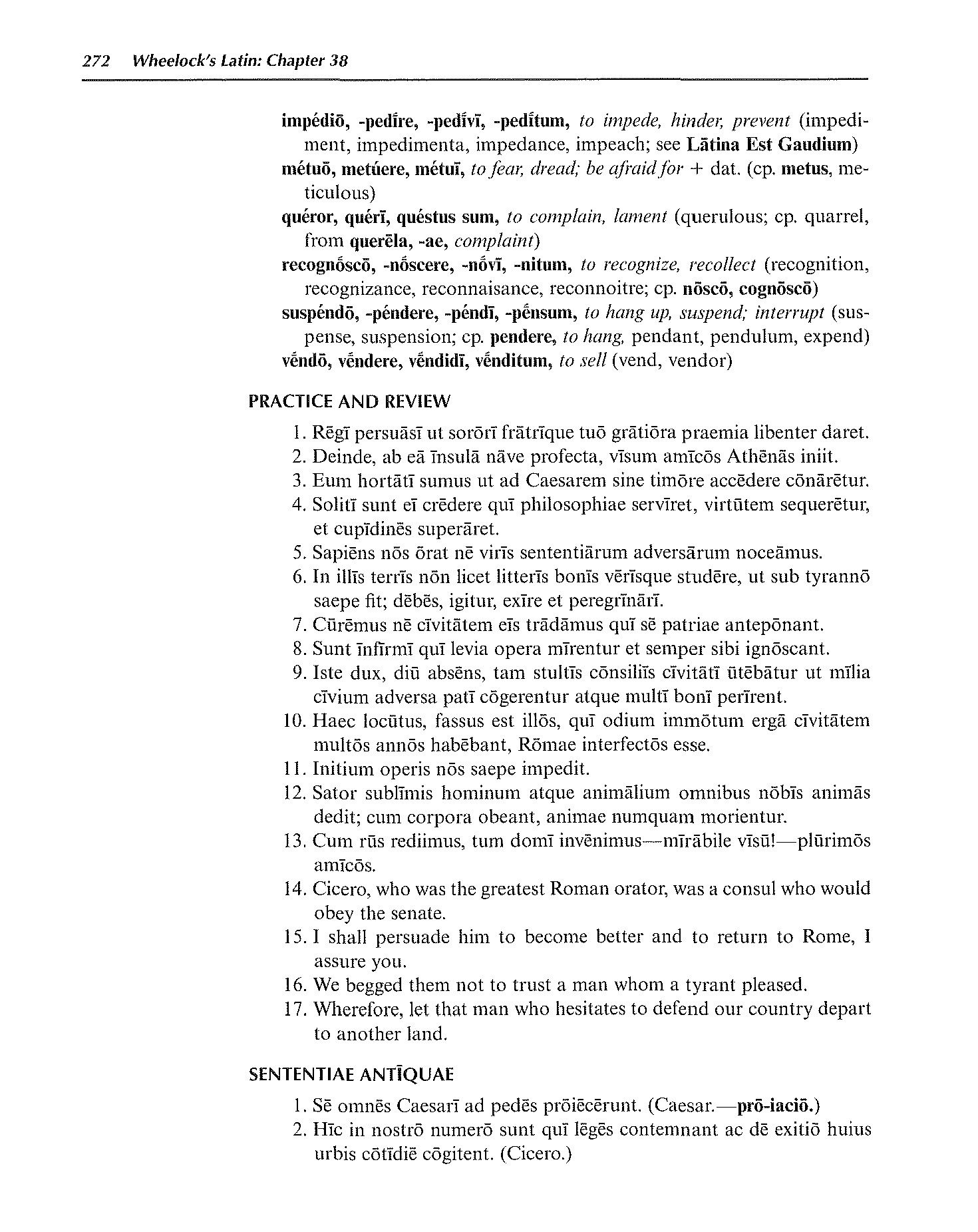
page_listing.tpl
page_subListingDetails.tpl
sub_listingDetails_style1.tpl
sub_listingDetails.title.tpl
vēndere to sell
vēndere is a Latin Verb that primarily means to sell.
Definitions for vēndere
Wheelock's Latin
Verb
- 1
to sell
English derivatives:
vend vendor
Oxford Latin Dictionary
Verb
- 1
To sell (goods). (b) (a person as a slave). (c) (neut. if pple. as sb.) a thing sold (in certain legal phrs. almost amounting to 'sale').
- 2
To give (one's services, skills, etc.) for a wage or fee (esp. w. implication that they should have been given free).
- 3
(pejoratively) To dispose of (a favour, privilege, etc.) for a reward or corrupt payment; to betray for money, sell.
- 4
(causatively. esp. transf.) To promote the sale of, obtain customers or admirers for.
Sentences with vēndere
Latin to English
Tu vendis aquam et bibis ipse merum.Compare You sell water and drink the pure wine yourself.
Itaque tibi decem dēnāriīs eum vēndam.Compare Therefore I will sell it to you for ten denarii.
Vendat oleum, si pretium habeat, vinum, frumentum quod supersit vendat; boves, vetulos armenta delicula, oves deliculas, lanam, pelles, plostrum vetus, ferramenta vetera, servum senem, servum morbosum, et siquid aliut supersit vendat. Patrem familias vendacem, non emacem esse oportet. (Id., II,7)Compare Sell the oil, if it fetches a good price, sell whatever excess there be of wine and grain; sell off the worn-out oxen, defective cattle, defective sheep, wool, hides, the old wagon, old tools, the aged slave, the sickly slave, and all else that is of no use. The proprietor of an estate should be eager to sell, not to buy.
Tu senatus auctoritas, salus civitas, totus res publica, provincia praemium vendo.Compare You sold the authority of the senate, the safety of the state, the whole commonwealth, for the bribe of a province.
Summus do opera a ego, ut quam plurimus decumae vendo.Compare The greatest trouble was taken by me to sell the tithes for as much as possible.
Beneficium accipere libertatem est vendere.Compare To accept a favor is to sell one's freedom.
Conjugation table for vēndere
Cactus2000
| ACTIVE | |
| Indicative present | Indicative imperfect |
| vēndō vēndis vēndit vēndimus vēnditis vēndunt | vēndēbam vēndēbās vēndēbat vēndēbāmus vēndēbātis vēndēbant |
| Indicative perfect | Indicative pluperfect |
| vēndidī vēndidistī vēndidit vēndidimus vēndidistis vēndidērunt / vēndidēre | vēndideram vēndiderās vēndiderat vēndiderāmus vēndiderātis vēndiderant |
| Indicative future | Indicative future perfect |
| vēndam vēndēs vēndet vēndēmus vēndētis vēndent | vēndiderō vēndideris vēndiderit vēndiderimus vēndideritis vēndiderint |
| Subjunctive present | Subjunctive imperfect |
| vēndam vēndās vēndat vēndāmus vēndātis vēndant | vēnderem vēnderēs vēnderet vēnderēmus vēnderētis vēnderent |
| Subjunctive perfect | Subjunctive pluperfect |
| vēndiderim vēndideris vēndiderit vēndiderimus vēndideritis vēndiderint | vēndidissem vēndidissēs vēndidisset vēndidissēmus vēndidissētis vēndidissent |
Infinitive present vēndere Infinitive perfect vēndidisse Infinitive future vēnditūrum esse | Imperative present vēnde vēndite Imperative future vēnditō vēnditō vēnditōte vēnduntō |
| PASSIVE | |
| Indicative present | Indicative imperfect |
| vēndor vēnderis vēnditur vēndimur vēndiminī vēnduntur | vēndēbar vēndēbāris / vēndēbāre vēndēbātur vēndēbāmur vēndēbāminī vēndēbantur |
| Indicative perfect | Indicative pluperfect |
| vēnditus sum vēnditus es vēnditus est vēnditī sumus vēnditī estis vēnditī sunt | vēnditus eram vēnditus erās vēnditus erat vēnditī erāmus vēnditī erātis vēnditī erant |
| Indicative future | Indicative future perfect |
| vēndar vēndēris / vēndēre vēndētur vēndēmur vēndēminī vēndentur | vēnditus erō vēnditus eris vēnditus erit vēnditī erimus vēnditī eritis vēnditī erunt |
| Subjunctive present | Subjunctive imperfect |
| vēndar vēndāris / vēndāre vēndātur vēndāmur vēndāminī vēndantur | vēnderer vēnderēris / vēnderēre vēnderētur vēnderēmur vēnderēminī vēnderentur |
| Subjunctive perfect | Subjunctive pluperfect |
| vēnditus sim vēnditus sīs vēnditus sit vēnditī sīmus vēnditī sītis vēnditī sint | vēnditus essem vēnditus essēs vēnditus esset vēnditī essēmus vēnditī essētis vēnditī essent |
Infinitive present vēndī Infinitive perfect vēnditum esse Infinitive future vēnditum īrī | Imperative present vēndere vēndiminī Imperative future vēnditor vēnditor - vēnduntor |
| PARTICIPLE | ||
| Participle present active | ||
| Nom. | vēndēns | vēndentēs |
| Gen. | vēndentis | vēndentium |
| Dat. | vēndentī | vēndentibus |
| Acc. | vēndentem | vēndentēs |
| Abl. | vēndente | vēndentibus |
| Participle future active | ||
| Nom. | vēnditūrus | vēnditūrī |
| Gen. | vēnditūrī | vēnditūrōrum |
| Dat. | vēnditūrō | vēnditūrīs |
| Acc. | vēnditūrum | vēnditūrōs |
| Abl. | vēnditūrō | vēnditūrīs |
| Participle perfect passive | ||
| Nom. | vēnditus | vēnditī |
| Gen. | vēnditī | vēnditōrum |
| Dat. | vēnditō | vēnditīs |
| Acc. | vēnditum | vēnditōs |
| Abl. | vēnditō | vēnditīs |
| Gerundive | ||
| Nom. | vēndendus | vēndendī |
| Gen. | vēndendī | vēndendōrum |
| Dat. | vēndendō | vēndendīs |
| Acc. | vēndendum | vēndendōs |
| Abl. | vēndendō | vēndendīs |
| Gerund | Supine | |
| Nom. | vēndere | vēnditum |
| Gen. | vēndendī | vēnditū |
| Dat. | vēndendō | |
| Acc. | vēndendum | |
| Abl. | vēndendō | |
Data sources
Notes
- Definitions
- Frederick M. Wheelock, Wheelock's Latin, 6th ed., rev. Richard A. LaFleur (New York, NY: HarperCollins Publishers, 2005): 272.
- P. G. W. Glare, Oxford Latin Dictionary, Vols. 1-8 (Oxford: Clarendon Press, 1982): 2026.
- Word frequencies
- Paul B. Diederich, The Frequency of Latin Words and Their Endings, PhD diss., (Columbia University, 1939).
Bibliography
Allen, Joseph H. Allen and Greenough's New Latin Grammar for Schools and Colleges: Founded on Comparative Grammar. Edited by James B. Greenough, George L. Kittredge, Albert A. Howard, and Benjamin L. D'Ooge. Boston, MA: Ginn & Company, 1903.
Crystal, David. A Dictionary of Linguistics and Phonetics. 6th ed. Oxford, UK: Blackwell Publishing, 2008.
Delatte, Louis, Suzanne Govaerts, Joseph Denooz, and Etienne Evrard. Dictionnaire fréquentiel et index inverse de la langue latine [Frequency Dictionary and Inverse Index of the Latin Language]. Liège, Belgium: Laboratoire d'analyse statistique des langues anciennes de l'Université de Liège (L.A.S.L.A.), 1981.
Diederich, Paul B. The Frequency of Latin Words and Their Endings. PhD diss., Columbia University, 1939.
Francese, Christopher. "Latin Core Vocabulary." Dickinson College Commentaries. Last modified 2014. http://dcc.dickinson.edu/latin-vocabulary-list.
Gildersleeve, Basil L., and Gonzales Lodge. Gildersleeve's Latin Grammar: Third Edition, Revised, and Enlarged. 3rd ed. London, England: Macmillan and Co., 1903.
Glare, Peter G.W. Oxford Latin Dictionary. Vols. 1-8. Oxford, England: Clarendon Press, 1982.
Krüger, Bernd. "Latin Conjugation Tables." Cactus2000. Accessed May 5, 2023. https://latin.cactus2000.de/index.en.php.
Pierson, Nick. "Sound of Text." Accessed October 26, 2019. https://soundoftext.com.
Wheelock, Frederick M. Wheelock's Latin. 6th ed. Revised by Richard A. LaFleur. New York, NY: HarperCollins Publishers, 2005.
Wiktionary Contributors. "Victionarium." Wikimedia Foundation, Inc. Updated March 18, 2019. https://la.wiktionary.org/wiki/Victionarium:Pagina_prima.
Citation
Chicago (17th ed.)
Allo Contributors. "vēndō, vēndere, vēndidī, vēnditum (v.) - Latin Word Definition." Allo Latin Dictionary. Last modified . Accessed February 20, 2026. http://ancientlanguages.org/latin/dictionary/vendo-vendere-vendidi-venditum.
Entry created on . Last updated on .








